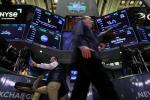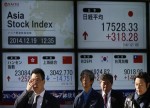
- All Instrument Types
- Indices
- Equities
- ETFs
- Funds
- Commodities
- Currencies
- Crypto
- Bonds
- Certificates
Please try another search

Fed Watch: Pressure Grows For More Aggressive Monetary Policy Tightening

Federal Reserve policymakers flooded the zone last week to signal their readiness to be more aggressive in raising interest rates if needed to fight inflation.
Fed Chairman Jerome Powell took the lead by remarking last Monday that the Fed will do whatever it takes to subdue inflation. Speaking to the annual economic policy conference of the National Association for Business Economics, he said:
"We will take the necessary steps to ensure a return to price stability. In particular, if we conclude that it is appropriate to move more aggressively by raising the federal funds rate by more than 25 basis points at a meeting or meetings, we will do so. And if we determine that we need to tighten beyond common measures of neutral and into a more restrictive stance, we will do that as well."
Numerous policymakers echoed this determination, prompting economists to start factoring in much bigger increases in the overnight federal funds rate.
Chicago Fed President Charles Evans, who tends to be dovish, said he is open to raising the policy rate by 50 basis points at a time. "We want to be careful, we want to be humble and nimble, and get to neutral before too long—maybe 50 helps, I’m open to that," he said in response to a question at a Detroit event.
Another dove, San Francisco Fed chief Mary Daly chimed in to say that both a 50 basis point interest-rate hike and a start on shrinking the Fed’s bond portfolio could be warranted at the May meeting of the Federal Open Market Committee.
Daly had loads of excuses as to why the FOMC was so wrong on inflation. Vaccine uptake wasn’t as strong as expected, parents had to stay home to take care of kids, supply-chain issues persisted, consumer demand exceeded expectations. Yada-yada-yada. It begs the question as to why they simply didn’t take action sooner. A lot of people got it right, but hardly any of them were policymakers at the Fed.
John Williams, head of the New York Fed and vice chairman of the FOMC, also used the word "nimble" (talking points, anyone?) to talk about Fed actions.
"What the right decision is in a given moment will depend on the situation then. If it’s appropriate to raise interest rates by 50 basis points at a meeting, then I would think that we should do that. If it’s appropriate to do 25, then we should do that. I don’t see any reason not to do one or the other."
Analysts began marking up their expectations, ranging from two half-point hikes at the next two meetings, followed by quarter-point hikes in this year’s remaining four meetings, to another projection of four half-point increases, followed by two quarter-point hikes. The latter would get the Fed to near 3% by the end of the year.
However, David Marsh, chairman of the Official Monetary and Financial Institutions Forum (OMFIF) and a longtime observer of monetary policy, raised the possibility that central banks would back away from provoking a recession by raising rates too much. The war in Ukraine makes it risky for them to create difficulties for politicians.
That conflict could go on, and central banks may just give up on inflation.
As Marsh wrote last week in an OMFIF commentary:
“The probability will increase that we will see central bankers deciding that a spell of inflation above 5% is a lesser evil compared with recession."
In any case, there is growing concern that the Fed and other central banks will not be able to engineer a "soft landing" for the economy. There is more talk of a "growth recession," meaning slower economic growth and a small increase in unemployment as central banks apply the monetary brakes.
These alternative scenarios may be so much wishful thinking. What we know for sure is that inflation is growing and is likely to continue on that path—and policymakers have consistently underestimated it.
Related Articles

Recent headlines appear to have shaken investor sentiment. It’s premature to read too much into a few days of weaker-than-expected survey numbers. More importantly, the latest...

The stock market sold off on a decline in February's Consumer Confidence Index (CCI), confirming a similar decline in February's Consumer Sentiment Index (CSI), which was reported...

The EU’s most costly budgets, bitcoin’s market swings, and rising US bankruptcies. Each week, the Syz investment team takes you through the last seven days in seven charts. 1. The...
Are you sure you want to block %USER_NAME%?
By doing so, you and %USER_NAME% will not be able to see any of each other's Investing.com's posts.
%USER_NAME% was successfully added to your Block List
Since you’ve just unblocked this person, you must wait 48 hours before renewing the block.
I feel that this comment is:
Thank You!
Your report has been sent to our moderators for review




Add a Comment
We encourage you to use comments to engage with users, share your perspective and ask questions of authors and each other. However, in order to maintain the high level of discourse we’ve all come to value and expect, please keep the following criteria in mind:
Perpetrators of spam or abuse will be deleted from the site and prohibited from future registration at Investing.com’s discretion.